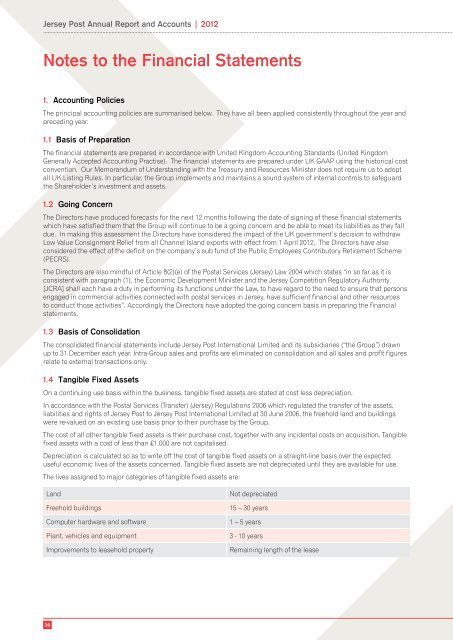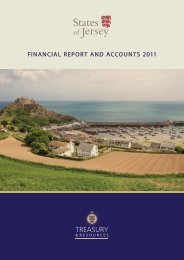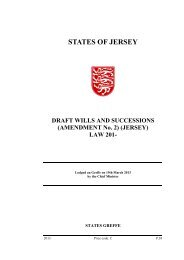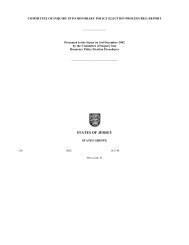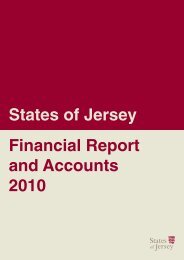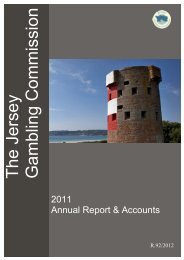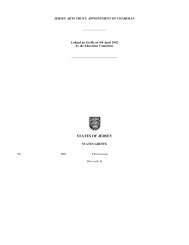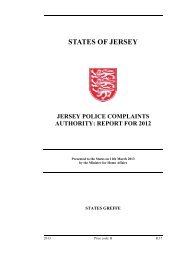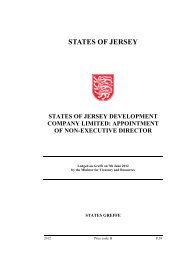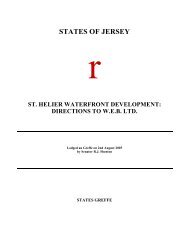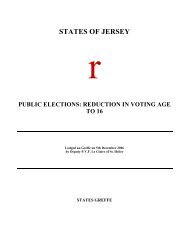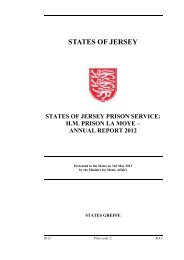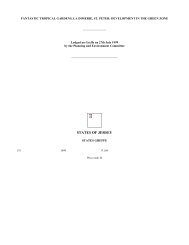Jersey Post Annual Report and Accounts | 2012 - States Assembly
Jersey Post Annual Report and Accounts | 2012 - States Assembly
Jersey Post Annual Report and Accounts | 2012 - States Assembly
You also want an ePaper? Increase the reach of your titles
YUMPU automatically turns print PDFs into web optimized ePapers that Google loves.
<strong>Jersey</strong> <strong>Post</strong> <strong>Annual</strong> <strong>Report</strong> <strong>and</strong> <strong>Accounts</strong> | <strong>2012</strong><br />
Notes to the Financial Statements<br />
1. Accounting Policies<br />
The principal accounting policies are summarised below. They have all been applied consistently throughout the year <strong>and</strong><br />
preceding year.<br />
1.1 Basis of Preparation<br />
The financial statements are prepared in accordance with United Kingdom Accounting St<strong>and</strong>ards (United Kingdom<br />
Generally Accepted Accounting Practise). The financial statements are prepared under UK GAAP using the historical cost<br />
convention. Our Memor<strong>and</strong>um of Underst<strong>and</strong>ing with the Treasury <strong>and</strong> Resources Minister does not require us to adopt<br />
all UK Listing Rules. In particular, the Group implements <strong>and</strong> maintains a sound system of internal controls to safeguard<br />
the Shareholder’s investment <strong>and</strong> assets.<br />
1.2 Going Concern<br />
The Directors have produced forecasts for the next 12 months following the date of signing of these financial statements<br />
which have satisfied them that the Group will continue to be a going concern <strong>and</strong> be able to meet its liabilities as they fall<br />
due. In making this assessment the Directors have considered the impact of the UK government’s decision to withdraw<br />
Low Value Consignment Relief from all Channel Isl<strong>and</strong> exports with effect from 1 April <strong>2012</strong>. The Directors have also<br />
considered the effect of the deficit on the company’s sub fund of the Public Employees Contributory Retirement Scheme<br />
(PECRS).<br />
The Directors are also mindful of Article 8(2)(e) of the <strong>Post</strong>al Services (<strong>Jersey</strong>) Law 2004 which states “in so far as it is<br />
consistent with paragraph (1), the Economic Development Minister <strong>and</strong> the <strong>Jersey</strong> Competition Regulatory Authority<br />
[JCRA] shall each have a duty in performing its functions under the Law, to have regard to the need to ensure that persons<br />
engaged in commercial activities connected with postal services in <strong>Jersey</strong>, have sufficient financial <strong>and</strong> other resources<br />
to conduct those activities”. Accordingly the Directors have adopted the going concern basis in preparing the financial<br />
statements.<br />
1.3 Basis of Consolidation<br />
The consolidated financial statements include <strong>Jersey</strong> <strong>Post</strong> International Limited <strong>and</strong> its subsidiaries (“the Group”) drawn<br />
up to 31 December each year. Intra-Group sales <strong>and</strong> profits are eliminated on consolidation <strong>and</strong> all sales <strong>and</strong> profit figures<br />
relate to external transactions only.<br />
1.4 Tangible Fixed Assets<br />
On a continuing use basis within the business, tangible fixed assets are stated at cost less depreciation.<br />
In accordance with the <strong>Post</strong>al Services (Transfer) (<strong>Jersey</strong>) Regulations 2006 which regulated the transfer of the assets,<br />
liabilities <strong>and</strong> rights of <strong>Jersey</strong> <strong>Post</strong> to <strong>Jersey</strong> <strong>Post</strong> International Limited at 30 June 2006, the freehold l<strong>and</strong> <strong>and</strong> buildings<br />
were re-valued on an existing use basis prior to their purchase by the Group.<br />
The cost of all other tangible fixed assets is their purchase cost, together with any incidental costs on acquisition. Tangible<br />
fixed assets with a cost of less than £1,000 are not capitalised.<br />
Depreciation is calculated so as to write off the cost of tangible fixed assets on a straight-line basis over the expected<br />
useful economic lives of the assets concerned. Tangible fixed assets are not depreciated until they are available for use.<br />
The lives assigned to major categories of tangible fixed assets are:<br />
L<strong>and</strong><br />
Freehold buildings<br />
Computer hardware <strong>and</strong> software<br />
Plant, vehicles <strong>and</strong> equipment<br />
Improvements to leasehold property<br />
Not depreciated<br />
15 – 30 years<br />
1 – 5 years<br />
3 - 10 years<br />
Remaining length of the lease<br />
36


